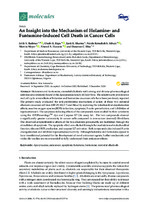An insight into the mechanism of holamine- and funtumine-induced cell death in cancer cells

View/
Date
2020Author
Badmus, Jelili A.
Ekpo, E. O.
Sharma, Jyoti R.
Metadata
Show full item recordAbstract
Holamine and funtumine, steroidal alkaloids with strong and diverse pharmacological activities are commonly found in the Apocynaceae family of Holarrhena. The selective anti-proliferative and cell cycle arrest effects of holamine and funtumine on cancer cells have been previously reported. The present study evaluated the anti-proliferative mechanism of action of these two steroidal alkaloids on cancer cell lines (HT-29, MCF-7 and HeLa) by exploring the mitochondrial depolarization effects, reactive oxygen species (ROS) induction, apoptosis, F-actin perturbation, and inhibition of topoisomerase-I. The apoptosis-inducing effects of the compounds were studied by flow cytometry using the APOPercentageTM dye and Caspase-3/7 Glo assay kit. The two compounds showed a significantly greater cytotoxicity in cancer cells compared to non-cancer (normal) fibroblasts. The observed antiproliferative effects of the two alkaloids presumably are facilitated through the stimulation of apoptosis. The apoptotic effect was elicited through the modulation of mitochondrial function, elevated ROS production, and caspase-3/7 activation. Both compounds also induced F-actin disorganization and inhibited topoisomerase-I activity. Although holamine and funtumine appear to have translational potential for the development of novel anticancer agents, further mechanistic and molecular studies are recommended to fully understand their anticancer effects.
